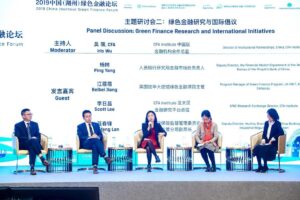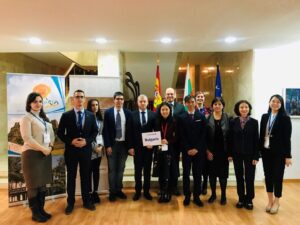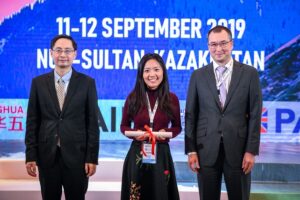Beibei Jiang
Fujitsu Scholar on the 2016 Fall Course
Local Action for Global Change
Profile
Head of China-UK Partnering for Accelerated Climate Transitions(PACT)–Green Finance Programme,
British Embassy Beijing
Interview
Beibei Jiang completed the Global Leaders for Innovation and Knowledge program during the Fall of 2016. She is passionate about global sustainability and women’s issues. These two themes have dominated her career and personal experiences to date. She continues to be involved in a wide range of projects in support of improvements to the global environment and is dedicated to living her life as an example of what people, and women in particular, can achieve, with passion and a clear vision of a brighter better future for the planet. Jiang learned from the Fujitsu program that change can begin at a grassroots level and that change comes from people and can multiply and improve livelihoods across a wide area. With a background in finance, she has spent most of her professional career in the field of green finance, working to encourage sustainable finance and promote environmentally-friendly projects. In line with this background and her experience in supporting green projects in China, Jiang based her Capstone Project around the idea of establishing a fund to match private investors with community scale projects. Now as the head of a 5-million-pound green finance technical assistance program at the British Embassy in Beijing, she is allocating funding to leading global green finance organizations and fulfilling the goals of her Capstone Project.
 (Spoke on a Green Finance Forum in Huzhou city, China in 2019 introducing UK-China collaboration on green finance. Huzhou is one of China’s green finance pilot zones initiated in 2018)
(Spoke on a Green Finance Forum in Huzhou city, China in 2019 introducing UK-China collaboration on green finance. Huzhou is one of China’s green finance pilot zones initiated in 2018)
―What do you hope to achieve through Green Finance Projects?
Put simply, green finance is the “greening” of the financial system by encouraging financial institutions to incorporate climate risk into their investment decision-making. It is also about encouraging institutions to utilize green finance products like green bonds and green insurance. Green funds support a low-carbon transition by mobilizing more private capital to support environmentally friendly projects.
More private sector investment is needed because there is a huge gap in terms of funds needed to support environmentally-friendly projects in green areas and the amount of public funds that are available. Most importantly, specialized funding will support the achievement of global climate goals of limiting the rise in temperatures to within 2° or 1.5° Celsius by 2030, in accordance with agreements reached at the 2015 UN Climate Change Conference in Paris.
That is the overarching goal of my current work, and we provide funding every year to a number of projects in China. We mainly work with NGOs, research institutions, academics, as well as other organizations that are working to shape green finance policies and mobilize private sector investment into this field.
Our program at the British Embassy in China was launched in 2018. Over the years since, we have allocated more than two million pounds to a number of Chinese organizations. These funds are primarily used for capacity-building projects with key Chinese governmental bodies as well as financial institutions in the private sector, to educate them about climate change issues and raise awareness about green finance, capital investment and to support development of green policies in China.
 (Led a group of young leaders to visit Bulgarian Embassy in Madrid in December 2019, as Chair of Model ASEM Young Leaders Forum working group on ‘Multilateralism’ as part of official Foreign Ministers’ ASEM meeting in Madrid)
(Led a group of young leaders to visit Bulgarian Embassy in Madrid in December 2019, as Chair of Model ASEM Young Leaders Forum working group on ‘Multilateralism’ as part of official Foreign Ministers’ ASEM meeting in Madrid)
―How did the Global Leaders for Innovation and Knowledge program change your perspective?
The Thailand and Hawaii modules in particular helped me understand how to be an authentic and open-minded leader with a greater vision adapted to a local context.
Most notably, the Doi Tung Development Project illustrated how to make the most of local resources. The project managers understood the needs of the local people, and helped them to transition into a sustainable model that would benefit the whole community, such as by planting trees, starting up production of coffee and bananas, and developing skills so they could create and sell handicrafts to support themselves.
That experience in Thailand is very relevant to my current management thinking because the projects we are funding have to really understand the context of China. They must truly benefit both the local community and help local Chinese cities reduce emissions to be considered successful. Therefore, I always try to be aware of the impact that we will bring to a local region or community, and seek to put forward win-win solutions that will be both sustainable and achieve a positive impact for all.
For example, this applies to low-carbon transition projects. In many Chinese cities, people are heavily reliant on coal, as it is still the cheapest energy source there. These cities have to go through a painful transition to phase out coal and use more renewable energy like solar and wind.
But there are many factors and issues to be considered around this transition. How will local workers who have been working in local coal power plants for decades find new employment? How can they gain the kind of skills necessary to work in other sectors?
Knowledge sharing is one way to address these social, economic and sustainability issues. The UK and other European countries already transitioned away from coal decades ago, so we can share case studies about their experience, including how green financing can support the transition and how clean energy creates jobs. At the same time, we also try to demonstrate how investment in coal leads to financial loss over long term creating ‘stranded assets’, so dirty energy will not make sense economically.
―How did your stance on being a leader change after the program?
Before the program I had this vague understanding that a leader was simply a manager. Now, I realize that managers and leaders are different. Being a good manager does not necessarily mean you are a good leader.
A leader is somebody who has vision and knows how to empower and influence others to deliver that vision. It’s also important to lead with your own style and use clear communication to help others understand your vision.
This is especially important when I’m engaging with a network of people. I’m constantly interacting with a wide range of stakeholders, including those in global organizations and governments, trying to persuade and influence them of my vision and challenge their behavior. Though this can be really difficult. Clear communication and the provision of mutually beneficial solutions is absolutely essential for a leader to bring others along on the same journey.
Finally, building mutual trust and open dialogue with your team is key to achieving objectives. A good leader ought to be concerned with helping their staff develop and fulfill their own ambition as well. Successful leaders nurture and encourage their teams so that they become successful in their own careers too. Now that I’m leading a team of three people, I find myself thinking about this on a daily basis.
―How would you describe the program in a single word?
Well, this may actually be three words, but I would say it’s like a “box of chocolates.” The Global Leaders for Innovation and Knowledge program is full of unexpected surprises, and you’re going to find so many positive aspects. Despite a duration of just three and a half months, the coursework has tremendous diversity and is very comprehensive.
Everybody will be able to pick up something useful from the many things in that “box.” They will definitely be able to find something that will suit their own personal and professional development objectives, whether they are working in the private sector, in government and policymaking, or in NGOs. There will be something that will catch their eye and will be useful for them and their future career, whatever they may be doing.
―What are your future goals?
For example, I am particularly interested in gender equality and women empowerment. This is also related to my current work in helping more vulnerable demographics, because women and children tend to be the more vulnerable group of people impacted by climate change, especially in developing countries.
Currently, I’m also part of the gender equality working group in the British Embassy. I’m trying to help shape discussions, arrange events and bringing leaders to speak about their own experiences. My hope is for them to empower and encourage more women and enable young girls to consider new opportunities and realize their dreams. Sustainability and gender issues will continue to be areas of focus that I’m keen to work on to bring a lasting and positive impact to society.
 (With Chair of China Green Finance Committee and Kazakhstan central bank representative on the Global Green Finance Leadership Programme in Kazakhstan in September 2019, funded by the UK PACT Programme (The programme that Beibei is leading at the British Embassy Beijing.)
(With Chair of China Green Finance Committee and Kazakhstan central bank representative on the Global Green Finance Leadership Programme in Kazakhstan in September 2019, funded by the UK PACT Programme (The programme that Beibei is leading at the British Embassy Beijing.)
― Summaries
① Summary of what was learned, changes in leadership
When adapting one’s vision to a local context, it’s important to understand local needs, make the most of local resources, and focus on sustainability that will benefit the local community. A leader is somebody that knows how to empower others to achieve their vision, and one should aim to be an authentic leader who communicates clearly and honestly.
② Scenes or situations to apply what was learned on the program
I always try to be aware of the impact that we will bring to a local region or community in China, and to put forward win-win solutions that will be sustainable and have a positive impact.
③ One-sentence summary of the Global Leaders for Innovation and Knowledge
The program is like a box of chocolates – you don’t know what you will get, but you are bound to find something good inside!



